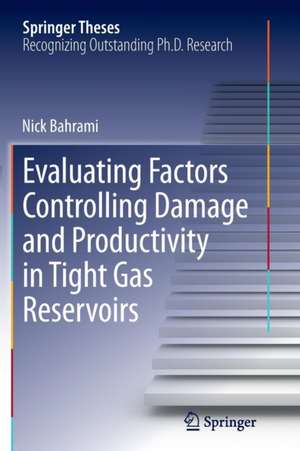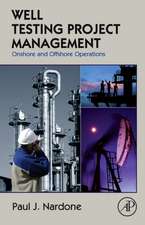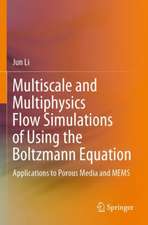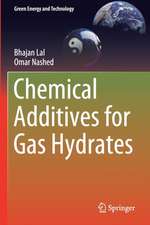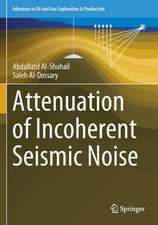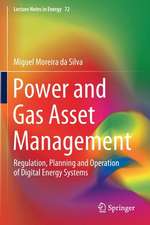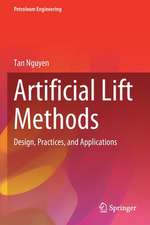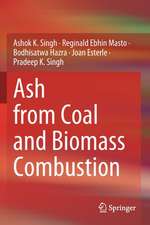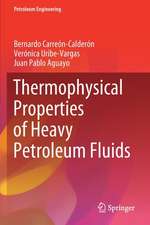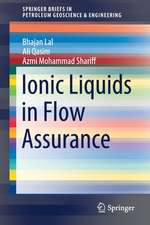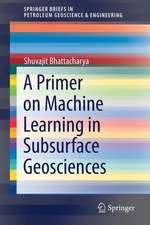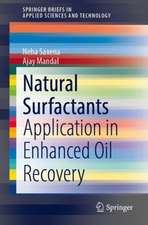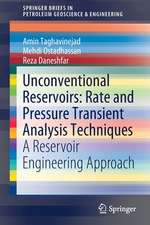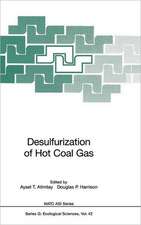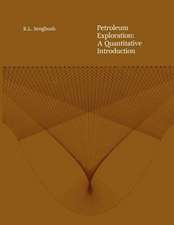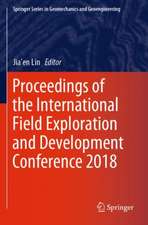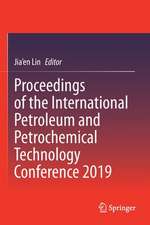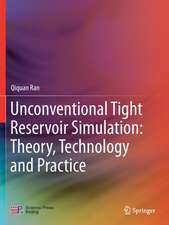Evaluating Factors Controlling Damage and Productivity in Tight Gas Reservoirs: Springer Theses
Autor Nick Bahramien Limba Engleză Paperback – oct 2016
This study demonstrates in detail the effects of different well and reservoir static and dynamic parameters that influence damage mechanisms and well productivity in tight gas reservoirs. Geomechanics, petrophysics, production and reservoir engineering expertise for reservoir characterization is combined with a reservoir simulation approach and core analysis experiments to understand the optimum strategy for tight gas development, delivering improved well productivity and gas recovery.
| Toate formatele și edițiile | Preț | Express |
|---|---|---|
| Paperback (1) | 629.41 lei 6-8 săpt. | |
| Springer International Publishing – oct 2016 | 629.41 lei 6-8 săpt. | |
| Hardback (1) | 633.53 lei 6-8 săpt. | |
| Springer International Publishing – 17 dec 2013 | 633.53 lei 6-8 săpt. |
Din seria Springer Theses
- 18%
 Preț: 997.88 lei
Preț: 997.88 lei -
 Preț: 389.88 lei
Preț: 389.88 lei - 15%
 Preț: 646.94 lei
Preț: 646.94 lei - 18%
 Preț: 943.43 lei
Preț: 943.43 lei -
 Preț: 399.29 lei
Preț: 399.29 lei - 18%
 Preț: 944.99 lei
Preț: 944.99 lei - 15%
 Preț: 636.80 lei
Preț: 636.80 lei - 18%
 Preț: 941.05 lei
Preț: 941.05 lei - 15%
 Preț: 643.16 lei
Preț: 643.16 lei - 15%
 Preț: 642.68 lei
Preț: 642.68 lei - 18%
 Preț: 1103.62 lei
Preț: 1103.62 lei - 20%
 Preț: 558.83 lei
Preț: 558.83 lei - 18%
 Preț: 1112.30 lei
Preț: 1112.30 lei - 18%
 Preț: 944.19 lei
Preț: 944.19 lei - 18%
 Preț: 1109.92 lei
Preț: 1109.92 lei - 18%
 Preț: 1217.27 lei
Preț: 1217.27 lei - 15%
 Preț: 640.06 lei
Preț: 640.06 lei - 15%
 Preț: 636.45 lei
Preț: 636.45 lei - 15%
 Preț: 640.06 lei
Preț: 640.06 lei - 15%
 Preț: 640.88 lei
Preț: 640.88 lei -
 Preț: 389.70 lei
Preț: 389.70 lei - 20%
 Preț: 563.91 lei
Preț: 563.91 lei -
 Preț: 393.35 lei
Preț: 393.35 lei - 15%
 Preț: 637.93 lei
Preț: 637.93 lei - 15%
 Preț: 641.85 lei
Preț: 641.85 lei - 18%
 Preț: 1225.94 lei
Preț: 1225.94 lei - 20%
 Preț: 551.36 lei
Preț: 551.36 lei - 18%
 Preț: 1229.10 lei
Preț: 1229.10 lei - 15%
 Preț: 639.25 lei
Preț: 639.25 lei - 18%
 Preț: 999.45 lei
Preț: 999.45 lei - 15%
 Preț: 640.06 lei
Preț: 640.06 lei - 18%
 Preț: 1220.45 lei
Preț: 1220.45 lei - 18%
 Preț: 1116.26 lei
Preț: 1116.26 lei - 18%
 Preț: 1110.72 lei
Preț: 1110.72 lei - 18%
 Preț: 1000.87 lei
Preț: 1000.87 lei - 18%
 Preț: 891.17 lei
Preț: 891.17 lei - 15%
 Preț: 640.06 lei
Preț: 640.06 lei - 5%
 Preț: 1154.07 lei
Preț: 1154.07 lei - 15%
 Preț: 635.96 lei
Preț: 635.96 lei - 15%
 Preț: 640.88 lei
Preț: 640.88 lei -
 Preț: 387.20 lei
Preț: 387.20 lei - 18%
 Preț: 1109.92 lei
Preț: 1109.92 lei -
 Preț: 385.25 lei
Preț: 385.25 lei -
 Preț: 385.25 lei
Preț: 385.25 lei - 18%
 Preț: 1112.30 lei
Preț: 1112.30 lei - 18%
 Preț: 999.45 lei
Preț: 999.45 lei -
 Preț: 386.99 lei
Preț: 386.99 lei - 15%
 Preț: 637.13 lei
Preț: 637.13 lei - 20%
 Preț: 554.21 lei
Preț: 554.21 lei - 20%
 Preț: 555.59 lei
Preț: 555.59 lei
Preț: 629.41 lei
Preț vechi: 740.48 lei
-15% Nou
Puncte Express: 944
Preț estimativ în valută:
120.44€ • 128.79$ • 100.42£
120.44€ • 128.79$ • 100.42£
Carte tipărită la comandă
Livrare economică 18 aprilie-02 mai
Preluare comenzi: 021 569.72.76
Specificații
ISBN-13: 9783319352404
ISBN-10: 3319352407
Pagini: 69
Ilustrații: XVI, 53 p. 37 illus., 14 illus. in color.
Dimensiuni: 155 x 235 x 4 mm
Greutate: 0.11 kg
Ediția:Softcover reprint of the original 1st ed. 2013
Editura: Springer International Publishing
Colecția Springer
Seria Springer Theses
Locul publicării:Cham, Switzerland
ISBN-10: 3319352407
Pagini: 69
Ilustrații: XVI, 53 p. 37 illus., 14 illus. in color.
Dimensiuni: 155 x 235 x 4 mm
Greutate: 0.11 kg
Ediția:Softcover reprint of the original 1st ed. 2013
Editura: Springer International Publishing
Colecția Springer
Seria Springer Theses
Locul publicării:Cham, Switzerland
Cuprins
Introduction to tight gas reservoirs.- Tight gas reservoirs characterisation for dynamic parameters.- Tight gas reservoir simulation.- Tight gas field example: effect of damage mechanims on well productivity.- Conclusions.
Notă biografică
Dr. Hassan Bahrami currently holds a Postdoctorate position and is the lecturer of practical petroleum engineering courses at the Department of Petroleum Engineering at Curtin University, and also works as consultant reservoir engineer for Aurora Oil and Gas in Perth, Australia and Houston, USA. Prior to joining Curtin University (2009-present), he worked for Schlumberger Data Consultant Services as Borehole reservoir engineer (2003-2009). Bahrami has PhD in Petroleum Engineering, MSc in Reservoir Engineering, and BSc in Chemical Engineering.
Textul de pe ultima copertă
Tight gas reservoirs have very low permeability and porosity, which cannot be produced at economical flow rates unless the well is efficiently stimulated and completed using advanced and optimized technologies. Economical production on the basis of tight gas reservoirs is challenging in general, not only due to their very low permeability but also to several different forms of formation damage that can occur during drilling, completion, stimulation, and production operations.
This study demonstrates in detail the effects of different well and reservoir static and dynamic parameters that influence damage mechanisms and well productivity in tight gas reservoirs. Geomechanics, petrophysics, production and reservoir engineering expertise for reservoir characterization is combined with a reservoir simulation approach and core analysis experiments to understand the optimum strategy for tight gas development, delivering improved well productivity and gas recovery.
This study demonstrates in detail the effects of different well and reservoir static and dynamic parameters that influence damage mechanisms and well productivity in tight gas reservoirs. Geomechanics, petrophysics, production and reservoir engineering expertise for reservoir characterization is combined with a reservoir simulation approach and core analysis experiments to understand the optimum strategy for tight gas development, delivering improved well productivity and gas recovery.
Caracteristici
Nominated as an outstanding Ph.D. thesis by Curtin University, Australia This work is a comprehensive study, focused on the evaluation of tight gas reservoir productivity from different perspectives – geomechanics, petrophysics, production engineering, and reservoir engineering – and integrates the results from different approaches to better characterize and understand the factors that can affect well productivity. Based on the evaluations, optimum strategies are proposed for tight gas reservoirs This is a unique study, presenting new practical knowledge and proposing new dynamic data analysis methods for the evaluation of tight gas reservoirs. The new practical methods introduced are examined and validated using simulation models; further, a number of field examples are presented to confirm the reliability of the proposed methodologies Due to the operational limitations and costs of data acquisition in tight gas reservoirs, there is normally a major lack of data in tight gas field studies, causing uncertainties in evaluation results. In this work, various types of tight gas reservoirs data are presented, which can serve as the typical input data for other tight gas field studies where only limited data is available Includes supplementary material: sn.pub/extras
